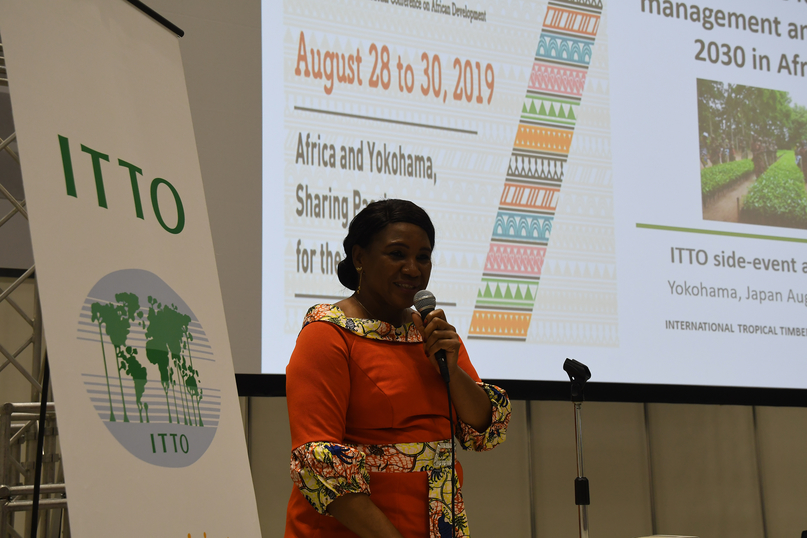More collaboration, participation, needed in Congo Basin to achieve SFM, says Minister Matondo
28 August 2019, Yokohama, Japan

H.E. Mme Rosalie Matondo, Congo’s Minister of Forest Economy and Ambassador for the Brazzaville Roadmap on Community-based Forestry in Central Africa addressing the audience at the side-evet at TICAD 7. Photo: K. Sato/ITTO
The Tokyo International Conference on African Development (TICAD) is an international conference led by the Japanese government and co-sponsored by the United Nations, the United Nations Development Programme, the African Union Commission and the World Bank. An estimated 4500 people attended TICAD 7 on 28–30 August 2019. ITTO, Japan’s Forestry Agency and the Japan International Cooperation Agency co-organized the side-event entitled “Sustainable forest management and Sustainable Development Goals 2030 in Africa”.
During her opening address at this ITTO event, Mme Matondo said international partners could help the people of the Congo Basin overcome the various constraints faced in the subregion in achieving Sustainable Development Goals 1 (“no poverty”), 13 (“climate action”) and 15 (“life on land”) through innovate technologies, know-how, entrepreneurship and capacity building.
Mme Matondo, who is also Ambassador for the Brazzaville Roadmap on Community-based Forestry in Central Africa, advocated a more effective community-based and participatory system for the sustainable management of forest resources in the context of the 2030 Sustainable Development Agenda.
“The operational objectives related to participatory forestry are, on the one hand, the promotion of decentralized—yet responsible and sustainable—community-based management of forest resources, and on the other hand, building the capacity of vulnerable communities living in and around concessions and protected areas to ensure their active participation in the management of forestry resources,” she said.
“Let us make local communities and indigenous peoples key players in the sustainable management of our forest ecosystems in order to combat climate change and inequality.”
Mme Matondo said she recognized the importance of ITTO’s initiative on building legal and sustainable supply chains to connect sustainable wood producers with markets, which would help local forest communities in the Congo Basin capture more of the value of wood production.
Download Minister Matondo’s Opening address (English and French)